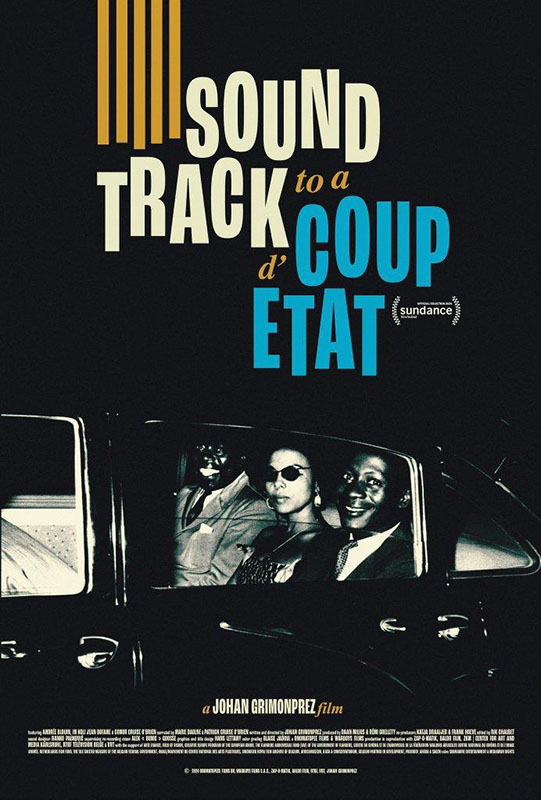Soundtrack to a Coup d'Etat
-
Réalisé par Johan Grimonprez • Écrit par Johan Grimonprez
-
Belgique, France, Pays-Bas • 2024 • 150 minutes • Couleur et Noir & Blanc
- Réalisation :
Johan Grimonprez - Écriture :
Johan Grimonprez - Image :
Jonathan Wannyn - Montage :
Rik Chaubet - Étalonnage :
Blaise Jadoul - Sound design :
Ranko Pauković - Documentaliste :
Judy Aley, Rémonde Panis, Pauline Burgaud
- Production (personne) :
Daan Milius, Rémi Grellety - Production (structure) :
Onomatopee Films - Coproduction :
Warboys, BALDR Film - Diffuseur :
RTBF - Radio Télévision Belge Francophone, VRT - Vlaamse Radio en Televisieomroep, ARTE France - Participation :
CINEMATEK - Cinémathèque royale de Belgique, Royal Academy of Fine Arts (University College Ghent / Hogeschool Gent), Procirep, Sacem, ZKM Center for Art and Media, Angoa-Agicoa, Creative Europe MEDIA - European Commission, VAF - Vlaams Audiovisuel Fonds / Flemish Audiovisual Fund (Fonds Audiovisuel de Flandre), CNC, NFF - Fonds Audiovisuel des Pays-Bas / Nederlands Fonds voor de Film, Fédération Wallonie-Bruxelles - FWB - Ayant droit :
Onomatopee Films
- N° ISAN :
non renseigné
Résumé
Avec l'indépendance du Congo en toile de fond, le film associe vague d'indépendance africaine, mouvement des droits civiques aux États-Unis et guerre froide, avec l'arme la moins conventionnelle des États-Unis : le jazz.
"Jazz et politique s’entremêlent dans le nouveau film de l’artiste Johan Grimonprez (auteur de Dial H-I-S-T-O-R-Y, 1997), qui documente un épisode international complexe et trouble de la guerre froide et de la décolonisation. À travers un montage galvanisant d’archives nombreuses, ce récit particulièrement dense et fouillé raconte notamment comment des musiciens tels que Louis Armstrong ou Nina Simone furent envoyés à travers le monde par des façades de la CIA pour distraire l’opinion publique des manœuvres secrètes pour contrecarrer l’union des nations africaines nouvellement indépendantes. Il raconte comment une force de paix telle que l’Organisation des Nations Unies est devenue un agent de déstabilisation après l’entrée de seize nations africaines qui rééquilibrait le rapport de forces en faveur de l’idée d’États Unis d’Afrique autour de la figure de Patrice Lumumba. La recherche de Grimonprez s’ancre dans l’accord secret passé entre Churchill, Eisenhower et l’état belge sur une option sur tout l’uranium découvert dans les mines congolaises, nécessaires au maintien de la dissuasion nucléaire américaine. Concrétisée trois jours avant l’indépendance du Congo par la privatisation de l’Union minière du Haut-Katanga, elle a mené à l’assassinat de Lumumba. Cette histoire de la remise en cause de l’autodétermination africaine est racontée du point de vue d’Andrée Blouin, militante des droits des femmes et politicienne de la République centrafricaine, du diplomate irlandais Conor Cruise O’Brien, de l’écrivain belgo-congolais In Koli Jean Bofane et de Nikita Khrouchtchev."
(Antoine Thirion - Cinéma du réel)
With the Congo independence as its backdrop, the film fuses the wave of African independence, the U.S. civil rights movement, the Cold War and the U.S. most unconventional weapon: jazz.
"In 1960, United Nations: the Global South ignites a political earthquake, musicians Abbey Lincoln and Max Roach crash the Security Council, Nikita Khrushchev bangs his shoe denouncing America’s color bar, while the U.S. dispatches jazz ambassador Louis Armstrong to the Congo to deflect attention from its first African post-colonial coup.
Director Johan Grimonprez (Double Take, 2009) returns to Sundance with this magnificent essay film that vibrantly embodies the historic and continually evolving colonial machinations that underpin what author and Congolese writer In Koli Jean Bofane refers to as an ever-evolving "algorithm of Congo Inc".
In addition to Bofane’s observations, Grimonprez invokes a veritable canon of African American jazz music to animate a rich fabric of griot texts, eyewitness accounts, official government memos, and testimonies from mercenaries and CIA operatives to shine light on one of the most insidious political machinations of the 20th century: how the Belgian monarchy, the United States government, and multinational corporations colluded to weaponize art institutions and legendary jazz musicians as cover for covert operations to assassinate Congo’s premiere prime minister, Patrice Lumumba.
Soundtrack to a Coup d’Etat is a timely story of precedent that speaks to today’s geopolitical terrain, in the Democratic Republic of Congo and around the world."
(SF - Sundance Film Festival)
Mot(s)-clé(s) thématique(s)
Sélections et distinctions
- 2024 • Sundance Film Festival • Utah (États-Unis) • World Cinema Documentary Special Jury Award for Cinematic Innovation
- 2024 • Cinéma du réel • Paris (France) • Compétition - Première française
- 2024 • Millennium Docs Against Gravity • Varsovie (Pologne) • Grand Prix Bank Millennium Award Competition
- 2024 • Festival de Cinéma de Douarnenez - Gouel Ar Filmou • Douarnenez (France) • Section "La Grande Tribu"
- 2024 • Quinzaine du cinéma francophone • Paris (France) • Sélection
- 2024 • Ji.hlava International Documentary Film Festival • Jihlava (République tchèque) • Constellations
Comment avoir accès au film ?
- Sortie en salle
-
Édition DVD
- Il n'existe pas d'édition DVD à notre connaissance
-
Accès VOD
- Il n'existe pas d'accès en VOD à notre connaissance
- Distribution
- Aide sur les moyens d'accéder à un film
